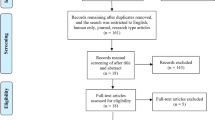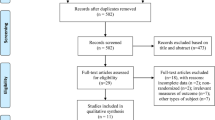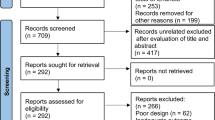Abstract
Background
Transcranial direct current stimulation (tDCS) emerged as a potential modality for enhancing cognitive functions in patients with cognitive decline, including mild cognitive impairment (MCI). Our systematic review and meta-analysis aim to synthesize the available randomized controlled trials (RCTs) on the effects of tDCS on cognitive functions in patients with MCI.
Methods
Our review protocol was registered on PROSPERO with ID: CRD42022360587. We conducted a systematic database search until September 2022. Standardized mean difference (SMD) and pooled effect size (ES) for robust variance estimation (RVE) method were used as effect estimates for our meta-analysis.
Results
We included 11 RCTs with a total of 429 participants. The meta-analysis showed that, compared to sham groups, tDCS did not improve global functioning (measured by MOCA) (SMD = 0.02, CI = − 0.30 to 0.35; p = 0.88), memory domain (ES = 0.681, CI = − 2.15 to 3.51, p = 0.576), sustained attention (measured by TMT-A) (SMD = − 0.21, CI = − 0.52 to 0.10, p = 0.19), and executive function (measured by TMT-B) (SMD = − 0.53, CI = − 1.56 to 0.50, p = 0.20).
Conclusion
Our meta-analysis found no significant effect of tDCS on cognitive functions in MCI patients, including effects on global functioning, memory, sustained attention, and executive function. Therefore, an important change to be tested in future studies is to look for a better combination with tDCS for patients with MCI.





Similar content being viewed by others
Availability of data and materials
Not applicable.
References
Jongsiriyanyong S, Limpawattana P (2018) Mild cognitive impairment in clinical practice: a review article. Am J Alzheimers Dis Other Demen 33:500–507. https://doi.org/10.1177/1533317518791401
Petersen RC, Lopez O, Armstrong MJ et al (2018) Practice guideline update summary: mild cognitive impairment report of theguideline development, dissemination, and implementation. Neurology 90:126–135. https://doi.org/10.1212/WNL.0000000000004826
Prestia A, Caroli A, Van Der Flier WM et al (2013) Prediction of dementia in MCI patients based on core diagnostic markers for Alzheimer disease. Neurology 80:1048–1056. https://doi.org/10.1212/WNL.0b013e3182872830
Liu L, Hayden KM, May NS et al (2022) Association between blood pressure levels and cognitive impairment in older women: a prospective analysis of the Women’s Health Initiative Memory Study. Lancet Heal Longev 3:e42–e53. https://doi.org/10.1016/S2666-7568(21)00283-X
Janoutová J, Šerý O, Hosák L et al (2015) Is mild cognitive impairment a precursor of alzheimer’s disease? Short review. Cent Eur J Public Health. 23:365–367. https://doi.org/10.21101/cejph.a4414
Weil RS, Costantini AA, Schrag AE (2018) Mild cognitive impairment in parkinson’s disease—what is it? Curr Neurol Neurosci Rep. https://doi.org/10.1007/s11910-018-0823-9
DeLuca GC, Yates RL, Beale H et al (2015) Cognitive impairment in multiple sclerosis: clinical, radiologic and pathologic insights. Brain Pathol 25:79–98. https://doi.org/10.1111/bpa.12220
Shinohara M, Yamada M (2016) Drug-induced cognitive impairment. Brain Nerve 68:421–428. https://doi.org/10.11477/mf.1416200415
Smith L, Jacob L, López-Sánchez GF et al (2021) Anxiety symptoms and mild cognitive impairment among community-dwelling older adults from low- and middle-income countries. J Affect Disord 291:57–64. https://doi.org/10.1016/j.jad.2021.04.076
Petersen RC, Caracciolo B, Brayne C et al (2014) Mild cognitive impairment: a concept in evolution. J Intern Med 275:214–228. https://doi.org/10.1111/joim.12190
Michaud TL, Su D, Siahpush M et al (2017) The risk of incident mild cognitive impairment and progression to dementia considering mild cognitive impairment subtypes. Dement Geriatr Cogn Dis Extra 7:15–29. https://doi.org/10.1159/000452486
Ganguli M, Jia Y, Hughes TF et al (2019) Mild cognitive impairment that does not progress to dementia: a population-based study. J Am Geriatr Soc 67:232–238. https://doi.org/10.1111/jgs.15642
Livingston G, Huntley J, Sommerlad A et al (2020) Dementia prevention, intervention, and care: 2020 report of the Lancet Commission. Lancet 396:413–446. https://doi.org/10.1016/S0140-6736(20)30367-6
Livingston G, Sommerlad A, Orgeta V et al (2017) Dementia prevention, intervention, and care. Lancet 390:2673–2734. https://doi.org/10.1016/S0140-6736(17)31363-6
Birks JS, Harvey RJ (2018) Donepezil for dementia due to Alzheimer’s disease. Cochrane Database Syst Rev. https://doi.org/10.1002/14651858.CD001190.pub3
Han JY, Besser LM, Xiong C et al (2019) Cholinesterase inhibitors may not benefit mild cognitive impairment and mild Alzheimer disease dementia. Alzheimer Dis Assoc Disord 33:87–94. https://doi.org/10.1097/WAD.0000000000000291
Pyun JM, Ryoo N, Park YH et al (2021) Change in cognitive function according to cholinesterase inhibitor use and amyloid PET positivity in patients with mild cognitive impairment. Alzheimer’s Res Ther 13:1–7. https://doi.org/10.1186/s13195-020-00749-5
Dhillon S (2021) Aducanumab: first approval. Drugs 81:1437–1443. https://doi.org/10.1007/s40265-021-01569-z
Cummings J, Aisen P, Apostolova LG et al (2021) Aducanumab: appropriate use recommendations. J Prev Alzheimer’s Dis. 8:398–410. https://doi.org/10.14283/jpad.2021.41
Guse B, Falkai P, Wobrock T (2010) Cognitive effects of high-frequency repetitive transcranial magnetic stimulation: a systematic review. J Neural Transm 117:105–122. https://doi.org/10.1007/s00702-009-0333-7
Vacas SM, Stella F, Loureiro JC et al (2019) Noninvasive brain stimulation for behavioural and psychological symptoms of dementia: a systematic review and meta-analysis. Int J Geriatr Psychiatry 34:1336–1345. https://doi.org/10.1002/gps.5003
Thair H, Holloway AL, Newport R et al (2017) Transcranial direct current stimulation (tDCS): a beginner’s guide for design and implementation. Front Neurosci 11:641. https://doi.org/10.3389/fnins.2017.00641
Chen J, Wang Z, Chen Q et al (2022) Transcranial direct current stimulation enhances cognitive function in patients with mild cognitive impairment and early/mid alzheimer’s disease: a systematic review and meta-analysis. Brain Sci. https://doi.org/10.3390/brainsci12050562
Buchwald A, Calhoun H, Rimikis S et al (2019) Using tDCS to facilitate motor learning in speech production: the role of timing. Cortex 111:274–285. https://doi.org/10.1016/j.cortex.2018.11.014
Hameed MQ, Dhamne SC, Gersner R et al (2017) Transcranial Magnetic and Direct Current Stimulation in Children. Curr Neurol Neurosci Rep 17. https://doi.org/10.1007/s11910-017-0719-0
Dubreuil-Vall L, Chau P, Ruffini G et al (2019) tDCS to the left DLPFC modulates cognitive and physiological correlates of executive function in a state-dependent manner. Brain Stimul 12:1456–1463. https://doi.org/10.1016/j.brs.2019.06.006
Page MJ, McKenzie JE, Bossuyt PM et al (2021) The PRISMA 2020 statement: an updated guideline for reporting systematic reviews. BMJ. https://doi.org/10.1136/BMJ.N71
Higgins JPT, Altman DG, Gøtzsche PC et al (2011) The cochrane collaboration’s tool for assessing risk of bias in randomised trials. BMJ. https://doi.org/10.1136/BMJ.D5928
Pustejovsky JE, Tipton E (2022) Meta-analysis with robust variance estimation: expanding the range of working models. Prev Sci 23:425–438. https://doi.org/10.1007/s11121-021-01246-3
Tipton E (2015) Small sample adjustments for robust variance estimation with meta-regression. Psychol Methods 20:375–393. https://doi.org/10.1037/met0000011
Melsen WG, Bootsma MCJ, Rovers MM et al (2014) The effects of clinical and statistical heterogeneity on the predictive values of results from meta-analyses. Clin Microbiol Infect 20:123–129. https://doi.org/10.1111/1469-0691.12494
Fisher Z, Tipton E, Zhipeng H (2017) Robumeta: Robust variance meta-regression. R Packag (Version 20). https://cran.r-project.org/web/packages/robumeta/vignettes/robumetaVignette.pdf
Viechtbauer W (2010) Conducting meta-analyses in R with the metafor package. J Stat Softw. 36:1–48. https://doi.org/10.18637/JSS.V036.I03
Das N, Spence JS, Aslan S et al (2019) Cognitive training and transcranial direct current stimulation in mild cognitive impairment: a randomized pilot trial. Front Neurosci 13:307. https://doi.org/10.3389/fnins.2019.00307
de Sousa AVC, Grittner U, Rujescu D et al (2020) Impact of 3-day combined anodal transcranial direct current stimulation-visuospatial training on object-location memory in healthy older adults and patients with mild cognitive impairment. J Alzheimer’s Dis 75:223–244. https://doi.org/10.3233/jad-191234
Yun K, Song IU, Chung YA (2016) Changes in cerebral glucose metabolism after 3 weeks of noninvasive electrical stimulation of mild cognitive impairment patients. Alzheimer’s Res Ther 8:1–9. https://doi.org/10.1186/s13195-016-0218-6
Gomes MA, Akiba HT, Gomes JS et al (2019) Transcranial direct current stimulation (tDCS) in elderly with mild cognitive impairment: a pilot study. Dement e Neuropsychol 13:187–195. https://doi.org/10.1590/1980-57642018dn13-020007
Gonzalez PC, Fong KNK, Brown T (2021) Transcranial direct current stimulation as an adjunct to cognitive training for older adults with mild cognitive impairment: a randomized controlled trial. Ann Phys Rehabil Med. https://doi.org/10.1016/j.rehab.2021.101536
Gu J, Li D, Li Z et al (2022) The effect and mechanism of transcranial direct current stimulation on episodic memory in patients with mild cognitive impairment. Front Neurosci 16:30. https://doi.org/10.3389/fnins.2022.811403
He F, Li Y, Li C et al (2021) Repeated anodal high-definition transcranial direct current stimulation over the left dorsolateral prefrontal cortex in mild cognitive impairment patients increased regional homogeneity in multiple brain regions. PLoS ONE. https://doi.org/10.1371/journal.pone.0256100
Kim J, Kim H, Jeong H et al (2021) tACS as a promising therapeutic option for improving cognitive function in mild cognitive impairment: a direct comparison between tACS and tDCS. J Psychiatr Res 141:248–256. https://doi.org/10.1016/j.jpsychires.2021.07.012
Liao YY, Liu MN, Wang HC et al (2021) Combining transcranial direct current stimulation with Tai Chi to improve dual-task gait performance in older adults with mild cognitive impairment: a randomized controlled trial. Front Aging Neurosci 13:888. https://doi.org/10.3389/fnagi.2021.766649
Martin DM, Mohan A, Alonzo A et al (2019) A pilot double-blind randomized controlled trial of cognitive training combined with transcranial direct current stimulation for amnestic mild cognitive impairment. J Alzheimer’s Dis 71:503–512. https://doi.org/10.3233/JAD-190306
Stonsaovapak C, Hemrungroj S, Terachinda P et al (2020) Effect of anodal transcranial direct current stimulation at the right dorsolateral prefrontal cortex on the cognitive function in patients with mild cognitive impairment: a randomized double-blind controlled trial. Arch Phys Med Rehabil 101:1279–1287. https://doi.org/10.1016/j.apmr.2020.03.023
Moafmashhadi P, Koski L (2013) Limitations for interpreting failure on individual subtests of the montreal cognitive assessment. J Geriatr Psychiatry Neurol 26:19–28. https://doi.org/10.1177/0891988712473802
Takeda C, Notoya M, Sunahara N et al (2011) Identification of three factors influencing trail making test performance using multichannel near-infrared spectroscopy. Tohoku J Exp Med 223:103–112. https://doi.org/10.1620/tjem.223.103
MacPherson SE, Cox SR, Dickie DA et al (2017) Processing speed and the relationship between trail making test-B performance, cortical thinning and white matter microstructure in older adults. Cortex 95:92–103. https://doi.org/10.1016/j.cortex.2017.07.021
da Silva ER, Rodrigues Menezes IR, Brys I (2022) Effects of transcranial direct current stimulation on memory of elderly people with mild cognitive impairment or alzheimer’s disease: a systematic review. J Cent Nerv Syst Dis 14:117957352211068. https://doi.org/10.1177/11795735221106887
Dudai Y, Karni A, Born J (2015) The consolidation and transformation of memory. Neuron 88:20–32. https://doi.org/10.1016/j.neuron.2015.09.004
Squire LR (2004) Memory systems of the brain: a brief history and current perspective. Neurobiol Learn Mem 82:171–177. https://doi.org/10.1016/j.nlm.2004.06.005
Hill NTM, Mowszowski L, Naismith SL et al (2017) Computerized cognitive training in older adults with mild cognitive impairment or dementia: a systematic review and meta-analysis. Am J Psychiatry 174:329–340. https://doi.org/10.1176/appi.ajp.2016.16030360
Mahdavi S, Towhidkhah F (2018) Computational human head models of tDCS: Influence of brain atrophy on current density distribution. Brain Stimul 11:104–107. https://doi.org/10.1016/j.brs.2017.09.013
Chhatbar PY, George MS, Kautz SA et al (2017) Charge density, not current density, is a more comprehensive safety measure of transcranial direct current stimulation. Brain Behav Immun 66:414–415. https://doi.org/10.1016/j.bbi.2017.08.008
Xu Y, Qiu Z, Zhu J et al (2019) The modulation effect of non-invasive brain stimulation on cognitive function in patients with mild cognitive impairment: a systematic review and meta-analysis of randomized controlled trials. BMC Neurosci. https://doi.org/10.1186/S12868-018-0484-2
Šimko P, Kent JA, Rektorova I (2022) Is non-invasive brain stimulation effective for cognitive enhancement in Alzheimer’s disease? An updated meta-analysis. Clin Neurophysiol 144:23–40. https://doi.org/10.1016/J.CLINPH.2022.09.010
Inagawa T, Narita Z, Sugawara N et al (2019) A meta-analysis of the effect of multisession transcranial direct current stimulation on cognition in dementia and mild cognitive impairment. Clin EEG Neurosci 50:273–282. https://doi.org/10.1177/1550059418800889
Chu CS, Li CT, Brunoni AR et al (2021) Cognitive effects and acceptability of non-invasive brain stimulation on Alzheimer’s disease and mild cognitive impairment: a component network meta-analysis. J Neurol Neurosurg Psychiatry 92:195–203. https://doi.org/10.1136/jnnp-2020-323870
Teselink J, Bawa KK, Koo GK et al (2021) Efficacy of non-invasive brain stimulation on global cognition and neuropsychiatric symptoms in Alzheimer’s disease and mild cognitive impairment: a meta-analysis and systematic review. Ageing Res Rev. https://doi.org/10.1016/j.arr.2021.101499
Talar K, Vetrovsky T, van Haren M et al (2022) The effects of aerobic exercise and transcranial direct current stimulation on cognitive function in older adults with and without cognitive impairment: a systematic review and meta-analysis. Ageing Res Rev. https://doi.org/10.1016/j.arr.2022.101738
Funding
We received no funding for this study.
Author information
Authors and Affiliations
Contributions
OS and MAS: conceived the idea. OS and MAS: designed the research workflow. MAS: searched the databases. OS, MAS, AAL, AAN, HT, and MAY: screened the retrieved records, extracted relevant data, assessed the quality of evidence, and MAS: resolved the conflicts. MAS: performed the analysis. OS: wrote the final manuscript. MA: supervised the project. All authors have read and agreed to the final version of the manuscript.
Corresponding author
Ethics declarations
Conflict of interest
The authors declare no conflict of interest.
Ethical approval
Not applicable.
Statement of human and animal rights
Not applicable.
Informed consent
Not applicable.
Consent to participate
Not applicable.
Consent for publication
Not applicable.
Additional information
Publisher's Note
Springer Nature remains neutral with regard to jurisdictional claims in published maps and institutional affiliations.
Supplementary Information
Below is the link to the electronic supplementary material.
Rights and permissions
Springer Nature or its licensor (e.g. a society or other partner) holds exclusive rights to this article under a publishing agreement with the author(s) or other rightsholder(s); author self-archiving of the accepted manuscript version of this article is solely governed by the terms of such publishing agreement and applicable law.
About this article
Cite this article
Saleh, O., Assaf, M., Alzoubi, A. et al. The effects of transcranial direct current stimulation on cognitive function for mild cognitive impairment: a systematic review and meta-analysis of randomized controlled trials. Aging Clin Exp Res 35, 2293–2306 (2023). https://doi.org/10.1007/s40520-023-02528-2
Received:
Accepted:
Published:
Issue Date:
DOI: https://doi.org/10.1007/s40520-023-02528-2




